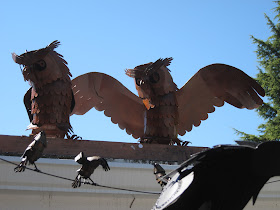I've been wanting to see the new suspension bridge at the Bellevue Botanical Garden for a while, ever since Mother's Day this year when it opened. Given that he has an engineering bent, Nigel wanted to see it too.
 |
| Welcome to Jurassic Park! |
After checking out the bridge, Nigel found a shady spot to sit and read his Kindle, while I made the rounds of the artists. There was a lot of glasswork, which is understandable, given we live in the glass art capital of the world, and some of it was really beautiful. But it can get a bit monotonous after a while. In fact, there were so many glass artists there I completely lost track of whose work I was photographing!
 |
| I did think this was a really cute bug vignette! |
 |
| Loved these glass leaves! |
 |
| I don't know where I'd put this full-size decorated torso, but it was pretty cool! |
 |
| This red agave was the size of a real agave, but quite a bit more expensive -- $430. |
 |
| I could see these huge herons beside my stream! |
 |
| There was a dragon on top of the Visitor's Center! |
 |
| And some owls too! |
 |
| Wouldn't this woodpecker look great on the side of a tree? |
 |
| I want this rooster too! |
 |
| Loved this earthenware pot! |
 |
| Another cool torso, with mosaics on it! |
 |
| I just adore mosaic art, and these mandalas really appealed to me! (I should have bought one.) |
 |
| There were faux cave paintings as well. |
 |
| Everyone admired this dangling mosaiced mermaid. |
 |
| Nice detail on a metal trellis |
 |
| I'd love some mosaic stepping stones like these, but they were for sale as a complete set for $300, and I didn't want the birdbath. |
I also managed to wander around the gardens and get a few shots of plants!
 |
| Was this plant with big leaves Astilboides? Darmera? Nope, the tag under it said Peltoboykinia tellimoides x watanabei. |
 |
| Tricyrtis flowers are so small and hard to spot, but so sweet and delicate when you see them up close. |
 |
| This blackberry lily had the most enormous seedpods! |
 |
| Nice foliage combo! Golden Hakone grass and Daphne odora (possibly 'Mae-Jima') |
It was hard to miss the large crowd around local plant guru and media personality Ciscoe Morris, who was leading a group around the garden, pointing out his favorite plants and looking very hot (temperature-wise, that is!)
Artist Info (for artists whose work is featured here, there were lots more whose business cards I didn't get -- click on names to reach websites):
Marcus Harper, glass artist
marcusharper@comcast.net
253-517-8130
Driftwood Creations
Carol Bryant
360-445-2182
Dean Tile and Design
Carol Rose Dean
info@deantile.com
360-331-1295
Jesse Kelly, glass artist
jessekellyglass@gmail.com
206-354-7368
Abraxas Crow Company
Gunter Reimnitz
Forge/Weld/Cut/Bend Steel Sculptures
reimnitz@olypen.com
360-379-3281
Unique Ceramics
Barbara Wyatt
BarbBQ3@aol.com
425-478-3801
Lance H. Carleton, sculptor
lancecarleton@comcast.net
206-617-9007
Mad Mosaics
Carman Komm
madmosaics@aol.com
253-250-3253
The show runs on Sunday, August 26 as well, from 10 a.m. to 6 p.m.
































